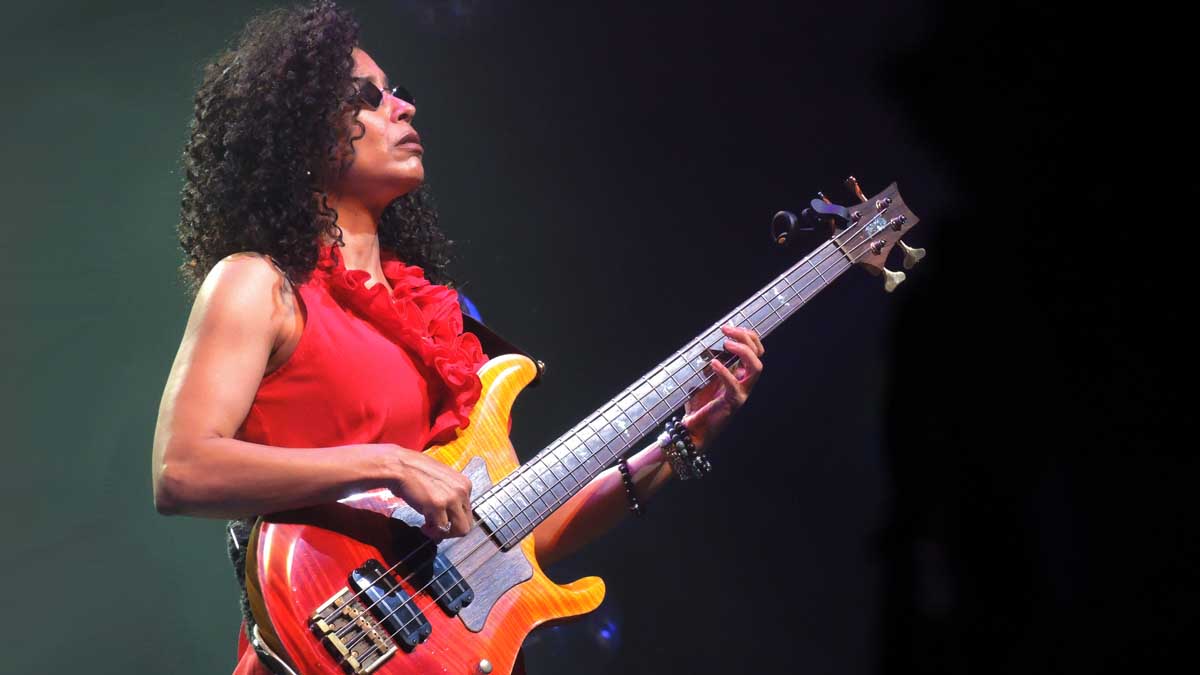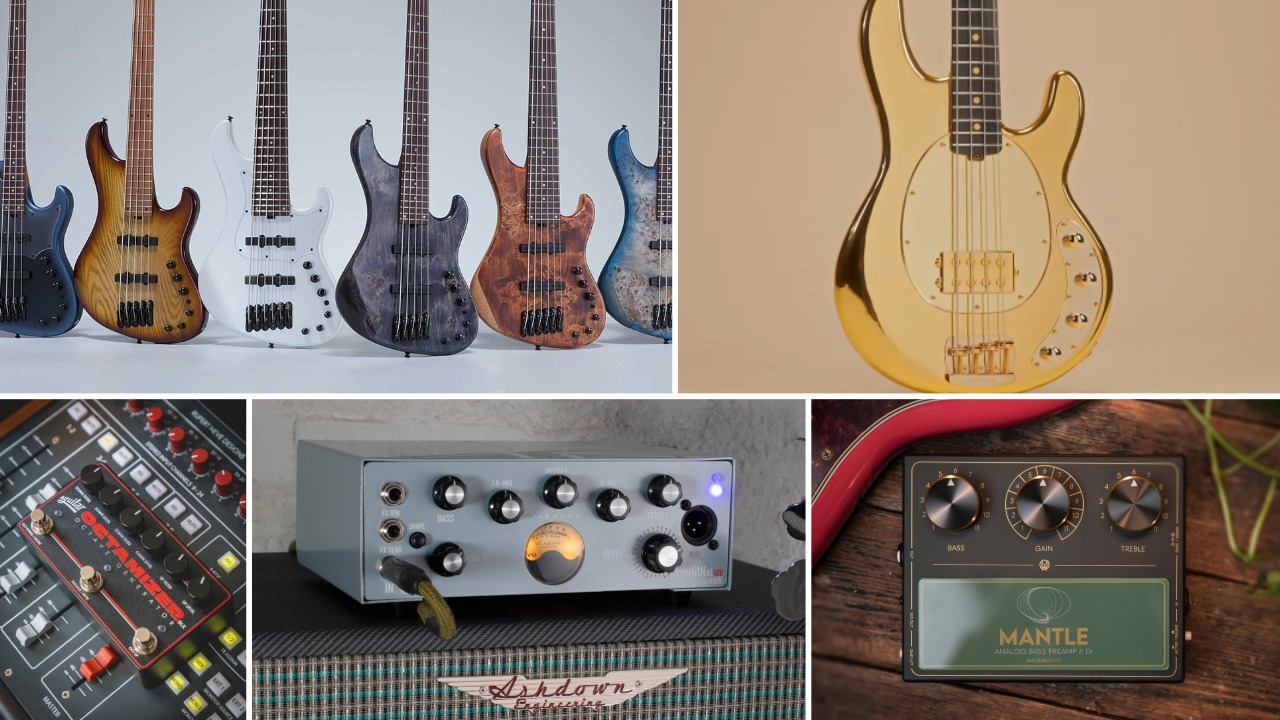Rhonda Smith: “The years I spent with Prince were absolutely incredible. It changed the trajectory of my life“
The Jeff Beck bassist checks in to talk gear, technique and her memories of working with The Purple One

Current Jeff Beck and former Prince bassist Rhonda Smith is a force of nature, even faced with a pandemic. Listen up as she reports from the front line of the low end...
How are you dealing with a year off the road, Rhonda?
“Well, Jeff has a record that they were going to release, and his tour is rescheduled until April 2021, so while we’re waiting for that to happen I’ve been playing a lot of bass and writing a lot. I have Pro Tools here at home, so when I want to record, I can just bang it out right here. I have a record of my own in the works too, so I’m looking to get some singles done and get them released in the best way in the current climate.“
Is a Paul Reed Smith still your go-to bass guitar?
“Yes it is – I’m still rocking that Gary Grainger PRS. Those Private Stock one-piece basses are so incredible, and mine is just part of my hands now. It was love at first sight for me. If somebody thinks they can beat it, they’re welcome to try, ha ha!
“I have a second one that’s exactly the same, but in white, as my backup. I also have a five-string version of the same bass, because some songs just sound amazing with that low B string, especially in an auditorium where you can take advantage of the dynamic range. It’s so powerful, although I use it sparingly. Normally I’ll take the five and the four out with Jeff, or all three basses if we’re out for longer.“
What other gear do you use?
All the latest guitar news, interviews, lessons, reviews, deals and more, direct to your inbox!
“I use Aguilar, too. I love their stuff, especially the big touring heads – they’re just amazing. They have a really strong presence around the world, which is important if you’re touring: You want to use really great amps, but some companies don’t have any overseas support because they’re so small. In that case, if you have a situation where your gear breaks, you’re done, but the Aguilar guys really have their stuff together.“
When you don’t have access to your preferred amps, which is the most unreliable hired-in gear?
“Usually it’s the speakers that are the problem, because they’ve been trashed. I’ve found that some backline companies check the heads when they come back in after a show or tour, but they don’t check the cabinets at a stage volume level.
“When the volume is at one or two, it sounds okay, but when you put it up to stage level, it’s fried. This happens all the time. And they don’t service the cabs often enough either – they just roll them in and roll them out. Of course, no-one says to them, ‘Oh, I blew your cabinet at the gig last night’, haha!“
I’m always experimenting and trying to find the perfect distortion sound that I’m looking for
Do you take both heads and cabs out on tour with you?
“With Jeff, we tour continually all over Europe and the US, so we always have a main rig and a backup. We’ll keep the same rigs for the entire tour: I take two Aguilar heads. I don’t use in-ears with Jeff.
“I’ve used in-ears with other artists such as Prince, and in the house band on several television shows back in the day, but not with Jeff. I prefer not to when I play live, because it’s bass, which your readers will understand. With Jeff, you listen and you love what you hear, with all the nuances smack right there.“
Do you take a pedalboard out, too?
“I always have a pedalboard, and it’s ever-changing. I always have a DigiTech Whammy pedal, which goes back to my Prince days, and I love MXR stuff, so I rock their Bass Chorus Deluxe and their Bass Envelope Filter.
“I also use their Carbon Copy Deluxe delay, and I have a couple of Morley pedals too – a Lock Wah and a Distortion Wah that I’m messing around with, because I’m always experimenting and trying to find the perfect distortion sound that I’m looking for.“
How close are you to finding it?
“I’m getting close, although it varies for different applications. I’m also using the Aguilar Agro pedal, which has an interesting distortion tone. I also use their Octamizer and the MXR Octaver, which has always been a really great pedal for me. So that’s my pedalboard if I’m just playing electric bass, but it’ll change if I’m playing an acoustic bass. All these instruments have different output levels, so they need different chains.“
Finding the right tone seems to be a lifelong task.
“Definitely. We copy other people when we learn to play, and then all the music that you play envelops your style and your soul and your feel, and you develop into your own player over time. It’s really interesting that there’s probably only a handful of players – maybe 10 or less – that we can listen to and identify by their sound.“
My mother used to listen to jazz when I was a child, and I’ve had such a love for jazz ever since then
For you, who are those people?
“For me, it was Geddy Lee; most definitely Stanley Clarke; Chris Squire, to a certain degree; and definitely Rocco Prestia, as well as a lot of acoustic guys, you know. My mother used to listen to jazz when I was a child, and I’ve had such a love for jazz ever since then.
“I really had a wide array of music around me. I was lucky because of the environment that I was in, which meant that I could listen to Jaco, and appreciate his sound. I’m a meld of different musical styles, just like everybody is.“
Which upright bass players influenced you?
“Charles Mingus and Ron Carter were so important to me – and of course Ron is one of the guys on the Berklee Bass Forums that I do now, which is amazing to me, because I was looking up to this guy when I was 12 years old. He is an amazing, amazing genius.“

What challenges do you face these days?
“I continue to learn every day, and that itself can be challenging. Challenges can be plateaus, or they can be techniques that I want to get faster at. I do it like a martial art: Slowly, and following the due process.
“I tell my students: ‘Sit down in front of the TV. You don’t even need an amp. Just work it slow, because a technique is like a muscle. Execute it well and then increase the speed, and then you’ll be doing it properly, not just playing gobble bass’.“
What has made you most proud?
“I’ve got to say, the years that I spent with Prince were absolutely incredible. There were lots of ups and downs, but it was a relationship that spanned from 1996 to 2010, when I joined Jeff Beck.
“It was on and off sometimes, and then we’d get back together, because we had a relationship where we needed to get separated, you know – so we’d get back together and then separate again, haha! But it was really amazing to be part of his experience. At the time it was the biggest thing that I had ever walked into, and it changed the trajectory of my life.“
Prince was a monster bass player. He used a lot of hybrid stuff that from an educational standpoint was bad technique, and wrong... But that, to my mind, was part of the sound that he got
How did you come to work with him?
“I auditioned for him quite a while before I got the gig, because he was not quick about making a decision like that. When I first met him, I brought a fretless bass down to the audition with me, because at that time in the Nineties a lot of people were using keyboard samples.
“I guess he liked the instrument, because he had me play on the Emancipation album. It was maybe 95 percent done, not completely finished, and he asked me to play the fretless on two songs. One was I Can’t Make U Love Me, which was a version of a Bonnie Raitt song, and the other one was Dreamin’ About U.
“That was his own composition, a very beautiful ballad – and he asked me to take a solo on it, with the fretless. I was thinking ‘What? I must have done something right.’ So there’s a lot of special moments there. It was the most amazing musical experience that I have ever had.“
What is your professional analysis of Prince as a bass player?
“Oh, he was a monster bass player. He used different techniques: in fact, he used a lot of hybrid stuff that from an educational standpoint was bad technique, and wrong, and you’d think that he shouldn’t have played like that. But that, to my mind, was part of the sound that he got.
“That guy could play some bass, you can believe it – and again, it’s all about the feel. It’s not about how fast he could play or whatever, it was his feel, which was phenomenal. He was from that Willie Weeks kind of school, where he could take two notes and do a solo with them, and make you go ‘What?’
“I respected that about him, and he knew exactly what he wanted from me. He really didn’t want me to play a five-string or a six-string – he wanted me to play a four-string, ideally a Fender Jazz. That was his choice.“
You and Prince were Bass Player’s cover stars in June 2004. He had some great things to say about you in that interview.
“The fact that he’s not here any more just makes all of that so much more valuable to me, and to a lot of other people who have a past with him. He was a wonderful man. I wouldn’t change anything for the world. I’m still in shock, as most people are, that he’s no longer here. It’s hard to believe.“
Prince was a wonderful man. I’m still in shock, as most people are, that he’s no longer here. It’s hard to believe.
What advice do you have for our readers?
“Do it because you love it and because you have a passion for it. Be pure about it – it’s as simple as that. In particular, ladies, don’t let anyone tell you that you can’t do something or you can’t play an instrument. Do it because you want it and because it’s amazing, and if you find that you have an innate love for it, it’s like a love affair.
“It will become the romance of the century and it will last decades. Bass means so many things to so many people. It can be structure, it can be math, it can be a savior for a lot of us that keeps us out of trouble and keeps us in places where we can be creative. I just say do it because you love it. Be as well rounded as you can be. Play everything, as long as it’s good music and it’s fun.“
Joel McIver was the Editor of Bass Player magazine from 2018 to 2022, having spent six years before that editing Bass Guitar magazine. A journalist with 25 years' experience in the music field, he's also the author of 35 books, a couple of bestsellers among them. He regularly appears on podcasts, radio and TV.

